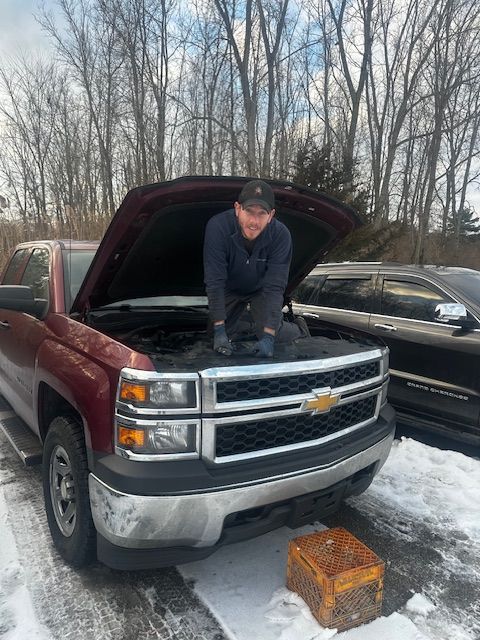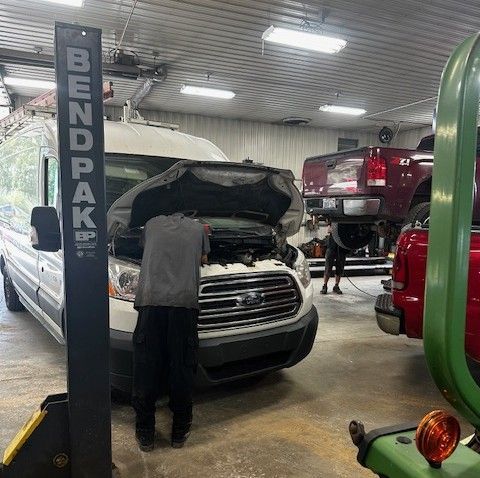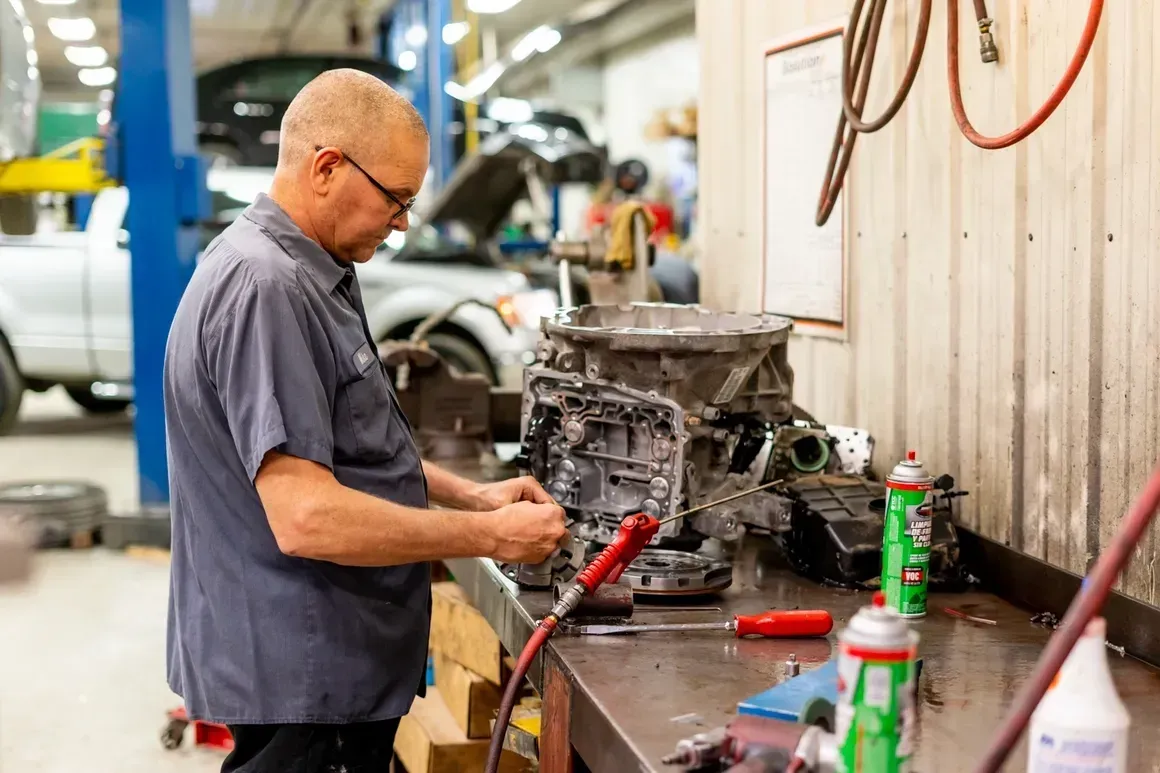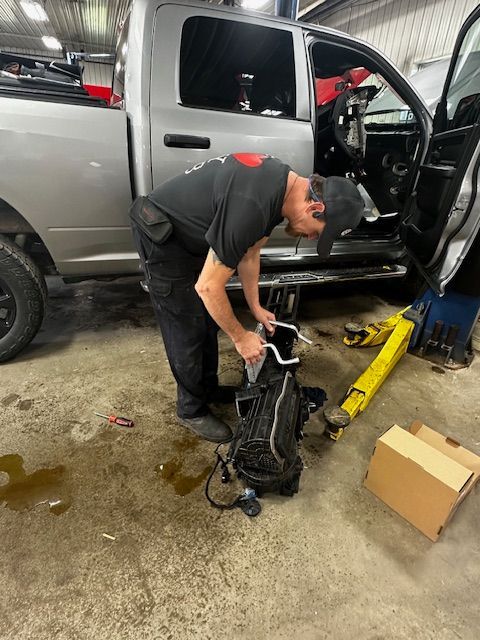Air Bags Explained
July 3, 2025
Airbags are safety devices designed to protect you in the event of a collision by reducing the impact force on your body—especially your head, neck, and chest.
Understanding Airbags: How They Keep You Safe on the Road
When it comes to vehicle safety, airbags are one of the most important features your car has. Most of us know they “pop out” in a crash, but have you ever wondered how they actually work—or why they're so important? At Faithful Auto and Truck Repair, we believe informed drivers are safer drivers. Here’s a simple breakdown of how airbags protect you and your passengers.
What Are Airbags?
Airbags are soft, fabric cushions that inflate in a split second during certain types of collisions. Their job? To absorb impact and reduce injury by acting as a buffer between you and the hard surfaces in your vehicle—like the steering wheel, dashboard, and windows.
How Do Airbags Work?
Your car is equipped with sensors that detect sudden stops or crashes. If the impact is severe enough, those sensors trigger the airbag system. A tiny explosive charge fills the airbag with gas (usually nitrogen or argon) in just milliseconds. Sensors Detect a Crash: Your vehicle has crash sensors that monitor sudden deceleration (like in a collision).
Signal Sent: If the impact is severe enough, the sensors send a signal to the airbag control unit.
Inflation: The airbag system ignites a small explosive charge that rapidly fills the airbag with a gas (usually nitrogen or argon) in about 0.03 seconds.
Cushioning Effect: The airbag inflates to create a cushion between you and hard surfaces like the steering wheel, dashboard, or windshield.
Deflation: Right after inflation, the bag deflates through small vents to absorb the energy of your body and allow movement.
Once deployed, the airbag cushions your body, especially your head, neck, and chest. After doing its job, it deflates quickly through small vents—reducing the risk of rebound injuries.
Types of Airbags in Today’s Vehicles
Modern vehicles have multiple airbags placed throughout the cabin:
Front Airbags – For the driver and front passenger. Standard in all cars since 1999.
Side Airbags – Built into doors or seats to protect your torso in a side impact.
Curtain Airbags – Drop down from above the windows to protect your head.
Knee Airbags – Help prevent leg injuries in a frontal crash.
Rear Airbags – Found in some newer models to protect backseat passengers.
Airbags + Seat Belts = Maximum Safety
One of the biggest safety misconceptions is that airbags replace seat belts. Not true! Airbags are designed to work with seat belts—not take their place. Without a seat belt, the force of an airbag alone can actually cause more harm than good. Always buckle up.
Maintenance Tips
While airbags don’t require regular maintenance, it's still a good idea to:
Check your dashboard for the airbag warning light—if it's on, something's wrong.
Have your airbag system inspected after an accident, even if it didn’t deploy.
Keep kids under 13 in the back seat with proper restraints.
Another important safety tip people often don't think about...Keep your feet off the dash while the vehicle is moving. The airbag can deploy upwards to 200mph.
At Faithful Auto and Truck Repair, we care about more than just keeping your car running—we want to keep you and your family safe. If your airbag warning light is on or you’ve recently been in an accident, stop by and let us take a look. We’re happy to answer any questions and give you peace of mind.
Need an inspection or vehicle safety check? Call us today or schedule online—we’re here to help!
https://youtu.be/WeczLrC91ow

Engine damage from cooling system problems: Potential cost $3,000-$8,000+ Many drivers think overheating only happens in summer, but winter can be just as dangerous for your engine. Low or weak coolant, small leaks, or a failing thermostat can cause serious damage when temperatures drop. In extreme cases, coolant can freeze and crack engine components. How to avoid it: Have coolant level and strength checked before winter, address coolant leaks right away, and never ignore temperature warnings or overheating. A simple coolant check can prevent catastrophic engine damage. Transmission Failure Triggered by Cold Weather: Potential cost $3,500-$6,500+ Cold weather thickens transmission fluid. If a transmission is already worn or leaking, winter can push it past the breaking point. Many failures start with subtle signs like delayed shifting, slipping on cold mornings, or harsh engagement. How to avoid it: Fix small leaks early, pay attention to shifting changes, and have transmission fluid condition checked, especially on higher-mileage vehicles. Catching transmission issues early can often save thousands. Suspension and Steering Damage from WInter Potholes: Potential cost: $1,200-$2,500+ Freeze-thaw cycles create potholes that are often hidden under snow or slush. These hard impacts commonly damage ball joints, tie rods, control arms, wheel bearings, and struts. What starts as a small noise can quickly turn into a major repair. How to avoid it: Have new clunks, rattles, or steering changes checked promptly, get an alignment check after hitting a large pothole, and watch for uneven tire wear. Ignoring suspension issues can lead to more damage and unsafe driving conditions. Brake System Damage from Salt and Corrosion Potential cost: $1,000-$2,500+ Road salt accelerates rust, especially on brake components. We often see seized calipers, corroded brake lines, and hardware failures during the winter months. This can turn a routine brake job into a much more expensive repair. How to avoid it: Have brakes inspected before winter, address brake noise or pulling immediately, and don't wait for warning signs like grinding or vibration. Early brake inspections can prevent full system replacement. Electrical Failures Caused by Weak Batteries Potential cost $800-$2,000+ Cold weather exposes weak batteries fast. A failing battery can damage starters, stress alternators, trigger warning lights, and leave you stranded at the worst possible time. How to avoid it: Have your battery tested before winter, replace weak batteries proactively, and address slow cranking early. A battery replacement is far cheaper than a tow and electrical diagnosis. Why Winter Repairs Get So Expensive Winter doesn't usually create problems- it exposes existing ones. Most major winter breakdowns start as: small leaks, minor noises, intermittent warning lights, and/or slight changes in how your vehicle drives. Fixing these issues early is almost always far less expensive than waiting for a breakdown. A thorough winter inspection can help catch small problems before they turn into costly repairs. At Faithful Auto and Truck Repair, we focus on honest, preventative inspections designed to keep you safe and help you plan. Michigan winters are hard on vehicles, but a little preparation now can save you thousands of dollars and a lot of stress later. If you're unsure your vehicle can survive the winter, we're happy to take a look and give you straightforward advice you can trust.

Common Reasons a Car Shakes When Accelerating Worn engine or transmission mounts can wear over time or even crack. The extra movement causes your car to vibrate during acceleration, especially when you shift from park to drive or give it gas. Another issue causing shaking could be bad CV axles or driveshaft. If you have a Front Wheel Drive vehicle, a damaged CV axle can cause heavy shaking when accelerating. Rear Wheel Drive vehicles might experience the same problem from a bent or unbalanced driveshaft. Unbalanced tires or misaligned tires cause uneven weight distribution creates vibration. You'll usually feel it more at higher speeds. Getting your tires balanced and rotated can quickly solve this. A misfire happens when one or more cylinders aren't firing properly. It could be a faulty spark plug, ignition coils, or fuel system issues leading to uneven engine operation, causing the engine to stumble or shake under acceleration. If your check engine light is on, this might be the reason why. Suspension or steering issues like loose control arm bushings, tie rods, or ball joints can cause your vehicle to feel unstable or cause shaking, especially when you speed up or hit bumps. If the vibration feels like a shudder during gear shifts or when speeding up from a stop, the issue could be with your transmission fluid, torque converter, or differential. What to Do When Your Car Shakes -Inspect your tires and wheels looking for wear, bulges, or missing wheel weights, look for broken or leaking motor mounts, and make sure all lugnuts are tight. -Note when it happens. During takeoff? It could be the drivetrain (axle, mount, engine). At highway speeds? Likely a tire or wheel balance issue. During gear shifts? Possibly transmission-related. Only under load? These clues help narrow it down. Its best to get a professional inspection by a trusted mechanic here at Faithful Auto and Truck Repair. A mechanic can check for bad mount, axle issues, or engine misfires. Simple issues like a tire balance or spark plugs are quick fixes- but if ignored, they can cause costly damage. A shaking car isnt something to ignore- it's your vehicle asking for help. It just doesn't feel bad- it can damage your tires, suspension, or drivetrain if ignored. At Faithful Auto and Truck Repair, our ASE certified technicains will pinpoint the cause of your vibration and get you back on the road fast.
Looking for reliable transmission repair in North Branch, MI? Trust Faithful Auto & Truck Repair for expert service. Schedule an online appointment now!

When you start your car and head out on the road, there's a lot happening under the hood that most drivers never think about. One of the most important parts working behind the scenes is the timing chain. While it might not get the psotlight like brakes, tires, or batteries, it plays a critical role in keeping your engine running smoothly. What Is a Timing Chain? A timing chain is a strong metal chain inside your engine that connects the crankshaft and camshaft(s). Think of it like the conductor of an orchestra- it makes sure all the engine's moving parts stay in perfect rhythm. The pistons and valves have to move at exactly the right time, and the timing chain makes that hapeen. Without it, the engine simply wouldn't run. Do All Cars Have Timing Chains? Not all cars use a chain. Every enegine needs a timing system, but some manufacturers use a timing chain (metal) while others use a timing belt (reinforced rubber). Both do the job, but chains generally last longer, while belts need replacement sooner. Why Is The Timing Chain So Important? The timing chain ensures precision inside your engine. If it stretches, skips, or breaks, the engine's timing is thrown off- and that ca lead to serious and costly damage like bent valves, piston damage, or even complete engine failure. In other words, when the chain fails, it can take the whole engine with it. How Long Do Timing Chains Last? One of the benefits of a chain over a belt is lifespan. Timing chains are designed to last a very long time- often 150,000-200,000 miles, and sometimes for the entire life of the vehicle. That said, they aren't invincible. The chain itself can stretch, and the guides or tensioners that keep it tight can wear down over time. Maintenance and Warning Signs Timing Chains are lubricated by engine oil, so the best way to take care of them is by keeping up with regular oil changes. Dirty or low oil can speed up wear and tear. Some common warning signs of timing chain touble include; -Rattling noises from the engine, especially at startup, -A check engine light, -Rough idling or misfiring. If you notice these symptoms, it's a good idea to have your vehicle inspected before the problem turns into something bigger. Why Do Timing Chains Need to Be Replaced? Eventually, even tough metal chains wear out. they can stretch, lose tension, or their guides can fail. Replacing a timing chain isn't cheap, but it's still much less expensive than repairing or replacing an engine after the chain has failed. The Bottom Line Your timing chain might not be something you think about often, but it's one of the hardest-working parts of your engine. With regular oil changes and good maintenance habits, it can last for years without trouble. But keeping an ear out for warning signs- and addressing them early-can save you from major engine damage down the road.
Expert brake repair and maintenance by Faithful Auto & Truck Repair in North Branch, MI. Drive safely with our professional services. Call us today!

A heater core is a small radiator-like component inside your vehicle, usually located behind the dashboard. It is part of your car's cooling system and heating system. It looks like a mini radiator, with tubes and fins, and it carries hot coolant from the engine. When the temperatures drop, most drivers don’t think twice about turning the heat on in their car. But behind that blast of warm air is a hard-working little part called the heater core. Understanding what it does and why it’s important can help you spot issues early and keep your car comfortable and safe. How does it work... your engine produces heat while running, and coolant circulates through the engine and absorbs that heat. Some of that hot coolant is routed into the heater core. A blower fan pushes air across the heater core's hot fins; in turn, the warm air is sent through your vents and into the cabin. So every time you turn your heater or defroster on, you're relying on the heater core to deliver that heat. Why the heater core matters... The heater core is more than just a comfort feature- it plays several key roles. It keeps you warm during cold weather. It directs warm air to your windshield to clear fog and ice for better visibility. The heater core regulates engine temperature by pulling heat from the coolant, preventing your engine from running too hot. Like any other car part, the heater core can wear out or leak over time. Be sure to watch for these symptoms: foggy windows inside the car, a sweet smell (from coolant) inside the vehicle, coolant leaking onto the passenger-side floor, no heat, or weak heat coming from the vents, and or engine overheating caused by low coolant levels. Why you shouldn't ignore heater core issues... A faulty heater core isn't just uncomfortable- it can leave you stranded. If it leaks, you'll lose coolant, which can cause your engine to overheat and lead to serious engine damage. Plus, driving without a heater or a working defroster is a safety risk in winter conditions. The heater core may be small, but it plays a big role in keeping your car safe, comfortable, and reliable. If you notice signs of heater core problems, it's best to have it checked out right away before it turns into a bigger repair. Check out our video on YouTube: https://youtu.be/qnsqRA0J9hI
Discover top-notch light duty diesel services at Faithful Auto & Truck Repair in North Branch, MI. Ensure your vehicle's performance and longevity. Visit us today!
Why Does My Car Battery Keep Dying?
A dead car battery is frustrating, and if it keeps happening, there’s usually an underlying issue. The most common cause is simply an old or weak battery—most only last 3–5 years. If yours struggles in cold weather or needs frequent jump-starts, it may be time for a replacement.
Discover top-notch transmission repair at Faithful Auto & Truck Repair in North Branch, MI. Ensuring smooth drives! Visit us today!
It's crucial for fluids to stay clean, especially the fuel. If it gets dirty, it can lead to problems with your engine, which can lead to expensive repairs.



